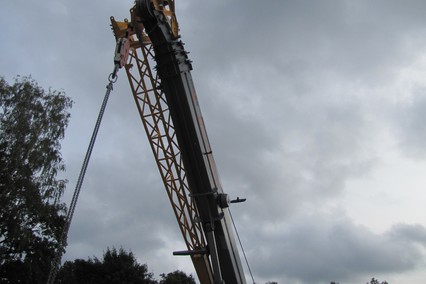Description
Mobile Crane And Other Loading Equipment Operator is responsible for operating a stationary or mobile crane to lift, move, position, and reposition loads. Depresses buttons, lifts levers, and ensures load is safely attached to crane before bringing it down. They perform pre-operational inspections. Operators calculate crane capacities and determine load weight, set up and dismantle cranes and position and stabilize the crane before the lift. They may also participate in rigging procedures. Operators also perform some routine maintenance and housekeeping of the crane equipment such as lubricating and cleaning. Other duties might be necessary as well.
Tasks:
1. Operate different types of cranes and other loading equipment under general supervision
2. Manipulate or depress cane controls to regulate speed and direction of crane and hoist movement according to written, verbal, or signal instructions
3. Repair cranes and other loading and heavy equipment as needed
4. Inspect crane and other loading and heavy equipment for safety issues on a daily basis and determine if any parts are malfunctioning
5. Complete job tickets, service quality summaries, and all other necessary paperwork
6. Lift, position and place machinery, equipment or other large objects at construction sites, mining sites and industrial facilities
7. Drive trucks to worksites and unload trucks
8. Place blocks and outriggers to prevent capsizing when lifting heavy loads
9. Move levers and pedals to rotate crane on chassis to raise and lower crane boom and to raise and lower load-line
10. Bolt boom sections together to extend or modify boom for pile driving or high lifting
Key skills for Mobile Crane and Other Loading Equipment Operator:
United Kingdom: £35,492 per year
United States of America: $51,620 per year
Australia: AU$30 per hour
Qualifications and training required:
There are no strict educational guidelines for mobile crane and other loading equipment operation. Most crane operators get their experience through on-the-job training or apprenticeships. Apprenticeship candidates generally must be 18 years or older, have a school diploma or equivalent and be in fit physical condition. Needed skills are gained on the job, with experienced staff instructing new operators until they are proficient enough to work on their own.
Some countries require crane and other loading equipment operators to be licensed. Procedures for obtaining a license vary, but usually include taking a physical exam, passing a written test and demonstrating safe crane operation. Operators must update licensure every few years. Some employers prefer crane operators to have a national certificate for the specific type of crane they are operating.
Tasks:
1. Operate different types of cranes and other loading equipment under general supervision
2. Manipulate or depress cane controls to regulate speed and direction of crane and hoist movement according to written, verbal, or signal instructions
3. Repair cranes and other loading and heavy equipment as needed
4. Inspect crane and other loading and heavy equipment for safety issues on a daily basis and determine if any parts are malfunctioning
5. Complete job tickets, service quality summaries, and all other necessary paperwork
6. Lift, position and place machinery, equipment or other large objects at construction sites, mining sites and industrial facilities
7. Drive trucks to worksites and unload trucks
8. Place blocks and outriggers to prevent capsizing when lifting heavy loads
9. Move levers and pedals to rotate crane on chassis to raise and lower crane boom and to raise and lower load-line
10. Bolt boom sections together to extend or modify boom for pile driving or high lifting
Key skills for Mobile Crane and Other Loading Equipment Operator:
- Be able to work well independently and in teams
- Patient and observant
- Good communicators
- Good at decision-making
- Hand/eye coordination
- Responsible and careful
United Kingdom: £35,492 per year
United States of America: $51,620 per year
Australia: AU$30 per hour
Qualifications and training required:
There are no strict educational guidelines for mobile crane and other loading equipment operation. Most crane operators get their experience through on-the-job training or apprenticeships. Apprenticeship candidates generally must be 18 years or older, have a school diploma or equivalent and be in fit physical condition. Needed skills are gained on the job, with experienced staff instructing new operators until they are proficient enough to work on their own.
Some countries require crane and other loading equipment operators to be licensed. Procedures for obtaining a license vary, but usually include taking a physical exam, passing a written test and demonstrating safe crane operation. Operators must update licensure every few years. Some employers prefer crane operators to have a national certificate for the specific type of crane they are operating.
Companies in profession
Best students in profession
Professions you might be interested in
Virtual internship
In our portal we are using cookies. Using the portal, you agree to the use of cookies. You can find out more!
Accept


